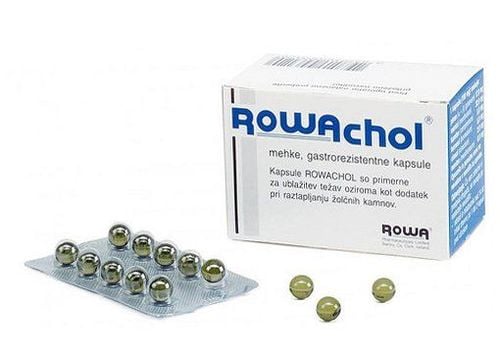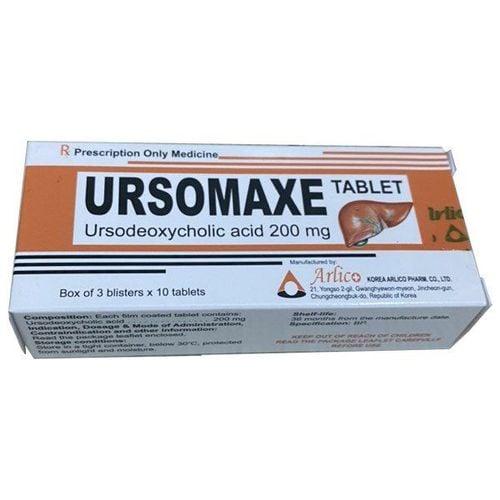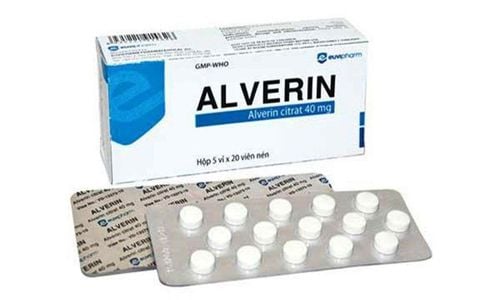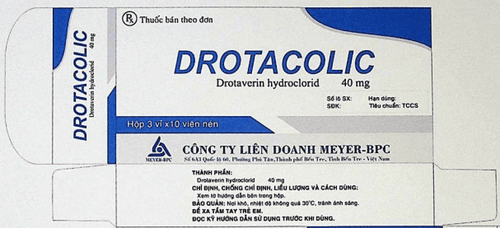This is an automatically translated article.
Tirokoon is a product of Hutecs Korea Pharmaceutical Co., Ltd (Korea). The active ingredient in this medicine is Tiropramide. The drug is indicated in the treatment of some cases of gastrointestinal spasms, irritable syndrome; biliary colic, biliary and urinary tract spasms.
1. Indications of the drug Tirokoon
Tirokoon is indicated for use in the following cases:
Treatment of gastrointestinal spasms and irritable syndrome. Treatment of biliary colic and biliary spasms such as cholecystitis, cholangitis, gallstones. Treatment of renal colic pain and some cases of urogenital spasm such as ureteral stones, pyelonephritis, kidney stones, cystitis. Treatment of some uterine contractions such as threatened miscarriage, dysmenorrhea, uterine contractions.
2. Pharmacodynamics
Tiropramide acts to limit spasms on smooth muscles of the gastrointestinal tract, urinary tract and genitourinary system. This drug has little effect on vascular smooth muscle.On the antispasmodic mechanism of tiropramide: Tiropramide increases intracellular cAMP concentrations. Because this drug activates cAMP synthesis. Increased cAMP levels lead to smooth muscle relaxation, while at the same time preventing calcium flux across the membrane.
By stimulating the binding of Ca++ ions to the sarcoplasmic reticulum, tiropramide sequesteres calcium in the sinuses of intracellular organelles. Tiropramide will inhibit the absorption and release of Ca++ ions.
Tiropramide is not a phosphodiesterase inhibitor at all. Therefore, the mechanism of action of tiropramide is completely different from that of papaverin on smooth muscle. Tiropramide has a very low affinity for calmodulin; the antispasmodic effect of tiropramide is independent of calmodulin.
3. Pharmacokinetics
After dosing, tiropramide plasma concentrations are found after about 18 - 27 minutes. Peak concentrations are reached in about 1-1.7 hours and the elimination half-life is in the range of 2.34 - 2.61 hours. Tiropramide and some of its metabolites are detectable in urine by liquid chromatography for a period of 24 hours after oral administration.
4. Dosage of Tirokoon
How to use: The drug is taken orally, can be taken with or without food.
Dosage:
For adults and children over 12 years old: 1 tablet each time (100 mg/2 - 3 times/day. For children under 12 years old: The safety and effectiveness of treatment have not been determined. Note: The above dosage is for reference only, the specific dose depends on the condition and progress of the disease in each person.To have the most suitable dose, you need to consult the doctor. opinion of a doctor or medical professional.
5. What to do if you miss a dose?
If you miss a dose, take it as soon as you remember it. However, if the interval between the next dose is too short, skip the missed dose and resume your dosing schedule. Never take a double dose to make up for a missed dose.
6. Tirokoon side effects
You may experience unwanted effects (ADRs) when using Tirokoon but it is rare, ADR < 1/1000
Digestive problems: Constipation, nausea, vomiting. Allergic phenomena: Erythema, itchy rash. Other problems: Dry mouth, feeling thirsty. Instructions on how to manage ADR When you experience any side effects of the drug, the first thing you need to do is to stop taking it. Then immediately notify your doctor or go to the nearest medical facility for timely treatment.
7. Tirokoon's Note
Before using Tirokoon, you need to carefully read the instructions for use and refer to some information below. Tirokoon is contraindicated in the following cases:
People who are sensitive to tiropramide or any of its ingredients. Patients with severe liver failure. People with mechanical stenosis of the gastrointestinal tract. People with colonic hypertrophy. 12 year olds, lactating women. Use caution when using Tirokoon for pregnant women. Use the drug only when absolutely necessary and must be consulted by a specialist. The drug should be used with caution in patients with glaucoma and prostatic hypertrophy. If an allergic reaction (erythema, pruritus) is detected, the drug must be stopped immediately. Tiropramide may interact with antihypertensive drugs. Thereby increasing the antihypertensive effect of calcium channel blockers It is not known whether tiropramide is excreted in breast milk or not. Therefore, do not use for women who are breast-feeding or must stop breastfeeding if taking the drug. Drug Interactions Tiropramide can interact with antihypertensive drugs, increasing the antihypertensive effect of calcium channel blockers, so caution should be exercised in the combination.
Vinmec International General Hospital is one of the hospitals that not only ensures professional quality with a team of leading medical professionals, modern equipment and technology, but also stands out for its examination and consultation services. comprehensive and professional medical consultation and treatment; civilized, polite, safe and sterile medical examination and treatment space.
Please dial HOTLINE for more information or register for an appointment HERE. Download MyVinmec app to make appointments faster and to manage your bookings easily.













